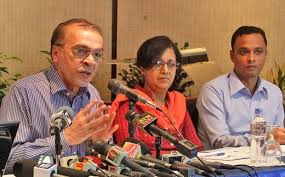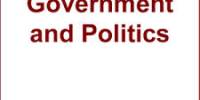Introduction:
Combating corruption is not easy task. Still no one denies the need to check corruption effectively. It may not be possible to eradicate corruption completely but then vigorous and determined actions will go a long way to minimize it. It also requires Courage and long-term commitment by a variety of anti-corruption actors. Political Leaders, champions amongst public servants, civil society, media, academics, the private sector and international organizations all play important roles in addressing corruption. To reduce the corrosive impact of corruption in a sustainable way, sit is important to go beyond the symptoms to tackle the causes of corruption.
COMBATING CORRUPTION STRATEGIE:
Since 1996, the World Bank has supported more than 600 anti-corruption programs and governance initiatives developed by its member countries .We believe that an effective anti-corruption strategy builds on five key elements which is given blew-
Increasing Political Accountability : A Political accountability refers to the constraints placed on the behavior of public officials by organizations and constituencies with the power to apply sanctions on th Sem. As political accountability increases, the costs to public officials of taking decisions that Benefit their private interests at the expense deferent disincentive to corrupt practices.[32] Ensuring political accountability the following steps should be taken-
(A)Political Competition
(B)Transparency
(C)Party Financing
(D)Rules and Legal Instruments
(A)Political Competition
Effective sanctions on politicians can be enhanced most effectively through a meaningful degree of political competition in the electoral process. Such competition increases the likelihood that alternative candidates and parties will seek to expose corruption in government of hold politicians accountable for the poor performance associated with high levels of corruption. Historically, anti-corruption and accountability measures were a by-product of these political struggles. While perceived corruption of a particular party of candidate has shown to influence voters’ decisions considerably and therefore exposure of cases of political corruption is an effective deterrent to corrupt behavior, there are limits to the benefits of political competition. Excessive political competition can become a destabilizing factor if it undermines the legitimacy of existing state institutions. Excessive political competition can undermine state can undermine state capacity and thus create conditions especially conducive to administrative corruption. Political competition is most effective in promoting accountability when it is channeled through organizations that provide broad constituencies with vehicles such as mass-based political leaders. Political parties than lack broad-based support are more likely to be dependent on powerful firms and financial interests for sources of financing and no electoral tactics such as vote-rigging, intimidation, and acquiring a monopoly over election coverage by the media. It is thus imperative that political parties be held to high standards of accountability.[33]
(B)Transparency
Transparency via public scrutiny has proven to be one of the most powerful forms of monitoring public officials. Such transparency can be fostered by a number of measures, including: opening sessions of the parliament, government, and the courts to the public; registering lobbying activities; and publishing the voting records of parliamentarians, annual reports of government bodies, A free and vibrant media is another important factor in making transparency work for the general public.
(C)Political Party Financing
Many Countries have established partial public funding, recognizing that political parties play a public interest role; they make an essential contribution to political contestability and the decentralized expression of divers values and interests. Public funding reduces the scope for private interests to “buy influence” and can also help reinforce limits on spending, because of the electorate’s resistance to excessive public expenditure. Ensure oversight. Set up an authoritative and independent Electoral Commission of Court to be responsible for the integrity of all issues regarding party finance and electoral rules,Such commissions have been set up in Canada, India, and South Africa.[34]
(D)Rules and Legal Instruments
There is a range of legal instruments as well as agency-specific rules which can be effective in deterring corrupt behavior. Ethics codes, regulations on lobbying disciplinary committees, prohibitions on and disclosure of conflict of interest, including the receipt of gifts and other benefits received form private resources, asset declaration laws, procurement laws and party financing laws are amongst the most prominent ones. Freedom of information laws, whereby citizens can demand the disclosure of information regarding government activities and a whistle-blower protection law in order to encourage the reporting of corruption cases can further reinforce the impact of increased transparency on accountability.
Strengthening Civil Society Participation:
As stakeholders in good governance and institution mediating between the state and the public, the organizations that comprise “civil society”- citizen groups, nongovernmental organizations, trade unions, business associations, think tanks, academia, religious organizations and last media- can have an important role to play in constraining corruption. This is true at the country level as well as internationally. Civil Society Organizations (CSO), with Transparency International spearheading the fight against corruption is the most prominent example of what an international civil society organization can achieve in awareness- raising, pressuring government as well as international organizations for change and pressuring governments as well as international organizations for change and working with various sectors to implement innovative anti-corruption reforms. Civil society as a third sector in a new governance structure can play a vital role in limiting corruption but they also have their limits. Without being elected democratically they lack formal legitimacy of political parties as well as accountability measures – a potential entry point for various civil society groups with questionable motives. A high degree of public scrutiny is thus important to hold civil society groups to the same accountability standards as the following steps-
(A)Civil Society’s Role in Fighting Corruption
(B)The Role of the Media
(C)Empowering Civil Society
(D)A word of Caution: Accountability and Legitimacy Issues
(A)Civil Society’s Role in Fighting Corruption
Since most cases of corruption involve public officials and private companies, Civil Society as an independent actor representing the interests of the general public is uniquely positioned to investigate and bring to light cases of corruption. This is achieved
through various functions:
= > Creating public awareness about corruption
=>Formulating and promoting action plans to fight corruption
=>Monitoring government’s actions and decisions in an effort to reduce corruption.
(B)The Role of the Media
A free and open media help expose levels of corruption by uncovering and shedding light
on abuses. In transition economies on Eastern on Eastern and central Europe, greater openness felt by the media since the rail of communism has brought with it a plethora of
stories of fraud, corruption, and criminal activity, making the media perhaps the most persistent institution in the fight against corruption. The Internet provides unprecedented opportunities of disseminating knowledge and increasing transparency across national borders in a timely fashion at low cost.
(C)Empowering civil society
For Civil society to realize its full potential it requires an appropriate legal and regulatory framework, including basic human rights such as the freedom of expression, association and the freedom to establish non-governmental entities. Requirements for registering should be reasonable and not constitute a serious hindrance in setting up a new CSO. In addition to the necessary breathing space, CSOs must further have the opportunity to mobilize funding. Tax exemption for donations is one way in effectiveness of CSOS is a function of access to information and knowledge as well as the ability to attract talent. Capacity constraints such as a lack of well-educated and highly motivated people can severely compromise the positive role civil society can play in combating corruption.
(D)A Word of Caution: Accountability and Legitimacy Issues
Civil Society Organizations (CSOS are not democratically elected. It should be in the interest of CSO to adhere to high standards of accountability, transparency and democratic management structures. The increasing availability if donor funding for CSO but it can also set wrong incentives. Some CSO are founded to attract donor funding for the personal benefit of founders and stuff. It would further be naive to assume that CSOs are immune to corruption. If co-opted by businesses of powerful elite’s they can be part of the problem, too. The public as well as donors should apply scrutiny in funding and working with CSOs. A strong track record and transparent business practices are usually good indicator of serious commitment and trustworthiness.
Creating a Competitive Private Sector:
The degree to which powerful elite’s influence decisions and policy-making of the state constraints the implementation of a fair, competitive, honest and transparent private sector and thus hinders broad-based economic development. The ability of powerful economic interest to capture the state can be constrained by:
(A)Economic policy liberalization
(B)Enhancing greater competition
(C)Regulatory reform
(D)Good corporate governance
(A)Economic Policy Liberalization
Deregulation of process of other aspects of production of trade are important steps toward reducing opportunities for corruption. Implicit price subsidies, in the form of tax and utility arrears, provide politicians and bureaucrats with discretionary power that is highly subject to abuse. Liberalization can help to reduce this discretionary power, but only if reform is undertaken in a transparent and non-discriminatory power, but only if reform is undertaken in a transparent and non-discriminatory way; otherwise there is a risk that the reform process itself will be corrupted.
(B)Enhancing greater competition
Enhancing competition, especially in concentrated sectors, by lowering barriers to entry, requiring competitive restructuring and clarifying ownership structures are important elements toward creating a vibrant and corruption free private sector. Competition can also be strengthened by introducing greater transparency in the ownership structure and operations of firms and banks, through requirements of financial disclosure and arm’s-length relationships, efficient registries, and better supervision of their operations by independent regularly bodies.
(C)Regulatory Reform
Proper regulation of utility companies and other industries in which competition remains. Imperfect is important to reducing corruption. The establishment of independent regulator agencies, both at the central and at the local level where regulatory capture is most pronounced, can be effective in promoting efficiency and limiting opportunities for corruption,as long as such institutions operate with transparency simplicity and accountability. Similar practices for regulating more routine aspects of business operations, such as registration and workplace safety are crucial limiting harassment of businesses by bureaucrats and promoting new entry and growth. For all types of regulation, firms should be provided with low-cost methods of disputing administrative decisions.
(D)Good Corporate governance
Weak institutions for corporate governance not only result in inefficiency they encourage corruption. Poorly governed managers often use their positions to extract favors from the state which they can later expropriate, rather than reinvest into restructuring their own firms, to avoid sharing their gains with other stakeholders. Corrupt behavior is often difficult to detect, especially in countries where transactions are obscured through the use of barter and other money surrogates as the means of payment. A wide array of corporate governance reforms have proven directive in curbing both incentives and opportunities for corruption, including: public disclosure of share ownership and cross-holdings; strong penalties for insider trading and pyramid schemes; the appointment of outsiders to boards of directors; the introduction of regular published independent audits of financial accounts based on standardized rules; the establishment of an effective legal framework for the exercise of creditors rights; and the strong enforcement of ethical standards.
Institutional Restraints on power:
The Institutional design of the state can be an important mechanism in checking corruption. Of particular importance is the effective development of institutional restraints within the state, which is most effectively achieved through some degree of separation of powers and establishment of crosscutting oversight responsibilities among state institutions. Effective constraints by state institutions on each other can diminish opportunities for the abuse of power and penalize abuses if they occur. For ensuring institutional restraints on power the following steps should be taken-
(A)Independent and Effective Judiciary
(B)Anti-corruption Legislation
(C)Independent Prosecution and Enforcement
(D)Audit Organizations
(E)Legislative Oversight
(A)Independent & Effective Judiciary
” Obey justice and restrain reckless wrongdoing, for such wrongdoing harms the poor, and even the noble find it an unwelcome burden that weighs them down and brings them ruin.” ( Hesiod, cirea 800 BCE) Corruption has a devastating effect on the legal system. It distorts law making, court ruling and law enforcement and in the end, erodes the rule of law. This has devastating consequences for the society as well as economic activity. The legal system is one of the fundamental Polaris of a market economy whose role as arbiter of the law encompasses both the formulation and implementation of public policy. In addition to deciding criminal cases the courts are responsible for upholding property rights enforcing coruscates, and settling disputes. Failure of any of these roles is costly, reducing incentives to invest or forcing firms to resort to more costly private means of contract enforcement and protection. In addition to these direct economic costs, a corrupt legal system has a wider impact, undermining the credibility of the state and making the implementation of public policy more difficult. Paradoxically, any anti-corruption strategy needs a functioning legal system to build on if it is to introduce real change. The challenge is therefore to clean up the legal system and turn it from being an arena of corruption into an effective tool for can be used as an effective first step within broader governance reform is outlined. An independent competent and clean legal system is key in every anti-corruption strategy.
(B)Anti-Corruption Legislation
While a well-functioning, competent and clean judiciary is key in upholding the rule of law on a day-to-day basis, anti-corruption laws turn out to be an effective means prosecute of an anti-corruption strategy. Anti-corruption laws work to deter corrupt actions, prosecute and resurrect a sense of justice, which has become a rare commodity in endemically corrupt countries. Legislation supporting the transition towards a corruption free society includes a freedom of information law, whereby citizens can demand the disclosure of information regarding government activities; a whistle-blower protection law in order to encourage the reporting of corruption cases; conflict of interest law, procurement laws and party financing laws. Anti-money laundering regulations also contribute towards curbing fraudulent practices.
(C)Independent prosecution and Enforcement
Independent prosecution remains a crucial challenge for many developing countries. Often the legal framework for anti-corrupt acts is often difficult to obtain, many countries have criminalized activities that are often associated with corruption, such as laundering proceeds from corruption and other crimes.
(D)Audit Organizations
Audit organizations can also have an important role. For full effectiveness, State Audit Offices should be backed by parliamentary committees that review and follow up on their reports. By contrast, watchdog enforcement agencies have a mixed record and have too often been subject to capture themselves. A condition for their effectiveness is the prior establishment of a core of strong, independent and credible professionals in the judicial, prosecutorial, and police arms of the state.
(E)Transparency and Recourse in Administrative Decision making
A frequent complaint is favoritism of the state in cases brought by citizens. Government decisions are less prone to corruption when they are predictable, transparent, and accountable. Administrative procedure law provides the legal foundation for sound government decisions providing rules for the way government bodies behave. These procedures protect the rights of citizens by guaranteeing participation in government decisions by interested parties, openness and transparency of decisions, adequate responses to public inquires, and the availability of recourse. Mechanisms of recourse include appeal within government bodies, judicial scrutiny and ombudsmen. Explicit administrative procedures allow citizens who are affected by administrative decisions to know that decisions will be made according to predictable rules rather than the will of theadministrator.
Improving Public Sector Management:
A fifth building block of an anti- corruption strategy consists of reforms in the internal management of public resources and administration to reduce opportunities and incentives for corruption. Reforming public sector management and public finance requires.
(A)A meritoric civil service with magnetized, adequate pay
(B)Enhancing transparency and accountability in budget management
(C)Enhancing transparency and accountability in tax and customs
(D)Policy reforms in sectional service delivery
(E)Decentralization with accountability
In most cases greater public oversight can play a key role in the reform process. The practice of political patronage in public administration continues to be an important source of corruption in many development countries. Political patronage can be a source of accountability to the patron, but it can undermine continuity and the development of standards, institutional values, and memory in the public sector. This opens the way to conflict of interest, misprocurement and theft of public funds. The short-term and uncertain nature of many political appointments also decreases the time horizons of public sector workers, creating incentives for predatory behavior.
(A)A meritoric civil service with magnetized, adequate pay
A first step in reforming public sector management is to eliminate patronage by institution meritocratic system for appointment, promotion, and evaluation and where feasible, establishing an independent civil service oversight body. In parallel it will be important to increase salaries, relate then to skill and responsibility, and regularize the extensive non-salary benefit that provide broad scope for discretion and corruption.
(B)Enhancing transparency and accountability in budget management
To improve transparency and accountability in fiscal management it is crucial to ensure full budget coverage and control. This can be achieved by reducing the diversion of resources into off-budget accounts that typically lack oversight and transparency. These off-budget accounts that typically lack oversight and transparency. These of-budget transactions take different forms, from extra-budgetary funds to lack of integration of investment planning and external financing into the budget. A further challenge is the significant magnitude of contingent liabilities stemming from nontransparent off-budget
commitments. The effectiveness of external audit entities varies greatly. To be effective in reducing corruption, external audit must be independent and equipped with strong auditing and diagnostic skills, moving beyond individual faults to target systemic weaknesses. Internet audit also needs to be developed further parliamentary and public oversight needs to be strengthened, with public dissemination of audit findings and scrutiny by Parliamentary Audit committees, which too often do not exist.
(C)Enhancing transparency and accountability in tax and customs
Corruption in customs and tax administration lowers state revenues, creates a distorted private sector environment and is often linked with smuggling and organized crime. Reforms to simplify tax policy and eliminate discretionary exemptions help, as does professional staff, standardization of forms and procedures, and transparent systems such as the use of computerized risk analysis at the borders. It is important to eliminate oneon- one contact between taxpayers and officials and ensure that operating and management systems are efficient and easily monitored, including through periodic taxpayer surveys.
(D)Policy reforms in sect oral service delivery
Finally, administrative corruption can be profoundly damaging to the level and quality of service delivery across key sectors. It is often deeply rooted in distorted policies, as illustrated in the energy and health sectors. Corruption, for instance, plagues the interface with customers and lies behind the low collection rates reported by many electricity, gas, and district heating companies. In Azerbaijan, the state-owned Baku Electricity Company reports a household collection rate of 12 percent despite employing 1,000 payment despite employing 1,000 payment collectors. Sale of the Distribution Company of privatization/management contracts can help, as long as tendering and contracting processes are transparent and contract execution can be monitored. Reducing non-cash transactions including barter and arrears offsets can also reduce private rent seeking, as non-cash exchange at artificially inflated rates is a standard method of extracting private gains.
(E)Decentralization with Accountability
Decentralization of service delivery can in principle makes the state more responsive to the needs of the people and improves service delivery. However, in countries where the accountability and capacity of sub-national governments is weak and where there are few safeguards against the manipulation of municipal assets and enterprises for the private gain of local officials, decentralization can actually increase corruption, bias resource allocation, and adversely affect access and quality in basic social services. Improving at the local level for local expenditures and to the central government in cases where expenditures are only administered by the local level (de-concentration) is a necessary first step. Reform efforts should strongly focus on creating regional local capacity in financial management and auditing, befor the decentralization process gets underway.
Prevention of corruption under International Law:
To prevent Corruption international community has taken steps in recent time .The 1988 UN Convention against Drug Trafficking established that illicit trafficking is drug and laundering of the proceeds from such trifling shall be criminal offence in the state parties and require the state parties to render the mutual legal assistance with respect to prosecution of such offence .On Dec 1996 the UN General Assembly adopted the United Nation Declaration Against corruption and bribery in International Commercial Transaction. The Declaration highlights the economic cost of corruption and bribery and points out that a stable and translation environment for international transactions in all countries is essential for the national borders.
The Anti-Corruption Commission:
There has been major changes recently brought about the anti-corruption regime in Bangladesh pursuant to the enactment of the Anti-Corruption Commission Act,2004 which has come into force on 09-05-2004 vide serial no-126-Law/2004dated9-5.2004 published in official gazette .An indefinite commission has been established there under for the purpose of effecting detection ,enquiry ,investigation and conduct of the corruption cases before the court.On the commencement of the Anti-Corruption Commission Act 2004,Anti –Corruption Act 1957 has been repealed and the Bureau of Anti-Corruption BAC has been abolished with the powers there under hitertho before exercise by the BAC and the government have been vasted in the Anti Corruption commition. Corruption has been marked as a great problem in the public administration and in the society. In this reason the present government had an election promise to check corruption and accordance to this forming a self Anti corruption Commission. At present to prevent the corruption and other offences more effectively, there is a govt. organization named Bureau of Anti corruption to investigate and inquiry under the Anti corruption Act, 1957 (Act No. XXVI of 1957). But for the reason of application and legal complexity, it is not possible to carryout perform its duty of Bureau of Anti corruption. Consider to all to check and prevent corruption, it has been seemed to need more firm, strong of the prevailing law system. So that, it will possible to prevent and check the corruption from the administration and in the society if there establish a self Anti corruption Commission. A bill titled ‘Anti corruption Commission Act 2003′ has been proposed instead of abolishing the prevailing Anti corruption Act, 1957 (Act no. XXVI of 1957) to prevent the corruption and correctional act and investigating of the definite offences in the country. It will possible to prevent and check the corruption from the society if the proposed bill become an Act and establish the Anti corruption Commission under this Act. Moreover this Act will keep an important role in the society to build good governance and conforming transparency in the administration along with preventing prevailing corruption. At the described situation, the bill titled ‘Anti Corruption Commission Act, 2003’ is presented at the great National Assembly.
RECOMMENDATIONS FOR
Public Sector:
A. establish the office of Ombudsman for curving corruption fairly;
B. reform the anticorruption bureau of Bangladesh for active against corruption;
C. develop comprehensive national strategies for combating corruption;
D.strengthen law enforcement mechanisms, including the role of the judiciary and provide witness protection programmes;
E. increase transparency through the establishment of competitive public procurement procedures and encourage the adoption of international rules in this area;
F. improve conditions for international investment through simplification of government procedures,
G. improve transparency and accountability in budget preparation, execution, and oversight of expenditure,
H. develop codes of ethics in public administration to be enforced by strong sanctions;
I. strengthen procedures for an effective and merit-based civil service, particularly recruitment, promotion and pay,
J. adopt “Freedom of Information” laws and provide access to public information,
K. strengthen parliamentary oversight, independent audit and investigative bodies to be backed by sufficient human and financial resources.
Private Sector:
A. establishing public-private partnerships to develop anti-corruption strategies, goals and processes;
B .promoting good corporate governance on the basis of international standards and principles;
C. strong commitment by top management of companies to implement anticorruption strategies;
D. developing and implementing codes of ethical conduct and ensuring their effectiveness through internal control mechanisms, training of personnel and sanctions;
E. accounting and auditing rules and standards to ensure transparency in business transactions;
F. building coalitions for business integrity, including business ethics centers.
Media and Civil Society:
A. mobilizing civil society (media, NGOs, business, labor, and professional associations) to monitor good governance;
B. creating an anti-corruption network of NGOs to share information on regional/country anti-corruption initiatives;
C . conducting surveys of businesses, consumers and public opinion to provide feedback for delivery of public services and fostering competition;
D. implementing education programmes aimed at fostering an anti-corruption culture in society;
E. enabling the media to effectively exercise public scrutiny;
F. improving ethical and professional standards of journalists and promoting training in investigative journalism.
Recommendations for Minimizing Corruption:
Corruption is criminal activities; it taints the giver and the taker in equal measure. Corruption has permeated the entire social system in our country. So, alleviating corruption is the prime concern for not only the government but also the nation as a whole. A single measure is not sufficient to remove existing corruption and prevent corruption. So the following measure can be adopted in this regard:
A. Political commitment is the sine qua non to prevent corruption. Democracy is the basic requirement of good governance. At present, democracy is passing miserable days. Long practices confrontational politics and political repression have made democracy paralyzed. But elected and effective parliament can play effective role in preventing and removing corruption. For that reason national consensus and restoration of democracy is needed without making any delay.
B. Independent and strong judiciary is the most effective safeguard against corruption. Independent judiciary is the indispensable requisite of a free society under rule of law.
C. Sometimes the National Human Rights Commission can play a role on the work of government officials with its watch dog mechanism. But for the last one decade, the bill relating to establishing NHRC has been pending with the hand of government high ups.
D. Departmental accountability of the government servant must be ensured. Corruption technology should be quickly introduced in public administration to assist in efforts for ensuring transparency and accountability and reduce red-tapism. Coordination between different departments at the district level should be strengthened. Attendance at the district coordination meetings should be made compulsory for all departmental heads. The local governments should be made stronger and the power of the administration should be effectively decentralized.[35]
E. Effective parliament can be the vital mechanism against corruption. A special parliamentary standing committee on corruption can be formed headed by an MP from the opposition so that parliamentary control can be effectively ensured against the corruption activities of government officials.
Conclusion:
Corruption is a complex multi-faceted social phenomenon with innumerable manifestations. It takes place as an outcome of deficiencies in the existing public administration apparatuses and systems as well as cultural, economic, political and social factors. Differences of opinion still exist as to the meaning of the term corruption. This is primarily because individuals look at corruption from their own vantage points influenced by surrounding environment. But what is heartening is that in recent years corruption is viewed from a much broader perspective rather than looking at it from moral and functional angles only. The causes of corruption are as varied as the phenomenon itself. Corruption results from the presence of a number of factors. There are many forms of corruption. To understand the dynamics of so many types of corruption attempts have been made to classify different forms of corruption into broad categories. What transpires from such a categorization is that outsiders can sponsor corruption resultant of political scandal, institutionalized and administrative malfeasance. The government needs a well-coordinated, well-understood overall strategy that limits opportunities for abuse of public office, increases the likelihood that individuals will be able to profit from corrupt acts, whether they are giving and receiving bribes. Moreover, the civil societies of the country should come forward to establish the right of the speople and to ensure the rule of law in Bangladesh. The professionals, the intellectuals through meetings and sittings, attending and participating the seminars and symposium and writing and contributing to the media can raise a general awareness to build up a corruption-free prosperous Bangladesh in future trial records, an the decisions of judges.
















